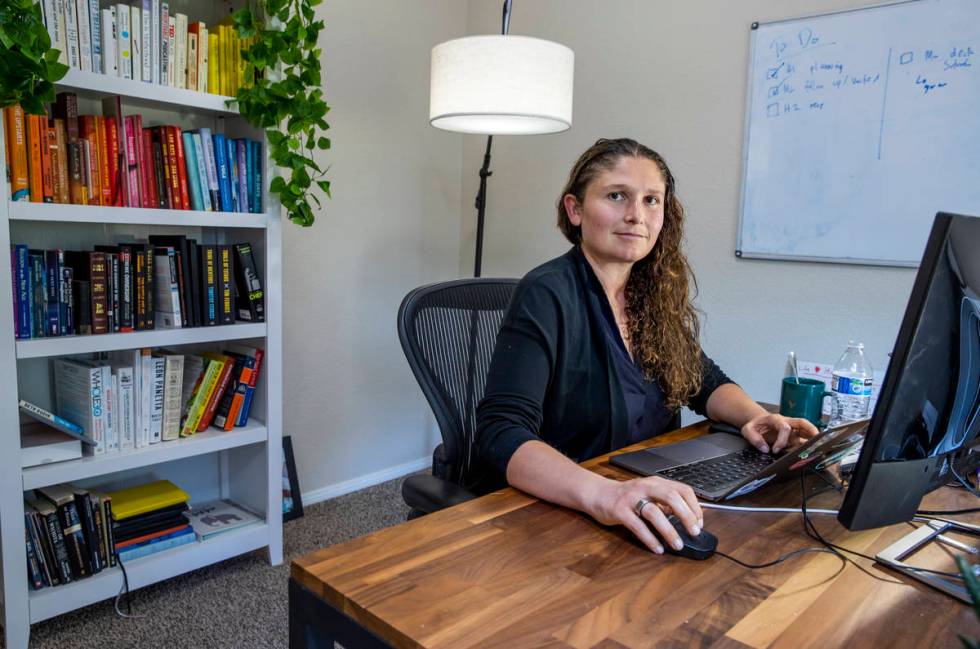Las Vegas recruiting remote tech workers from San Francisco, Seattle

Las Vegas wants to be your next work-from-home office.
Many big tech companies are allowing their employees to work from home during the COVID-19 pandemic, and the city of Las Vegas sees it as an opportunity to attract new minds and economic growth to a place with “a growing center of tech” in downtown.
It’s why the city’s Economic and Urban Development department announced last week a media campaign targeting workers in technology hubs who want to keep their jobs but live elsewhere. The campaign involves digital advertising in San Francisco and Seattle, a newly launched promotional website called innovate.vegas and a LinkedIn messaging blitz.
The pitch is this: If you’re going to work from home, why not a place with sunnier skies, less traffic congestion and no state income tax.
“What do you have to lose to try Vegas out?” asks business development manager Ryan Smith, who works on the campaign.
Workers like Valerie Villarreal, a 35-year-old product manager for Instagram, are in.
She moved to Summerlin from Palo Alto about a month ago, prior to the campaign’s launch, but for many of the reasons the campaign identifies as selling points.
Instagram shifted its employees to work from home, freeing up Villarreal to ditch the Bay Area for the valley, where she has family.
She said the biggest perks of living in Las Vegas are financial: cheaper childcare, cheaper cost of living and cheaper housing than the “astronomical” costs of her previous Palo Alto home. Increasingly frequent wildfires in California also have worsened the air quality, she adds.
“There’s just a lot of things about California that a lot of people are like, ‘Why am I paying to live next to an office that I don’t go to commute to?’” Villarreal said. “I moved to be five minutes from my Palo Alto office, and now I was paying like a stupid amount of rent for no reason.”
‘Yeah, I’m gonna move to Las Vegas’
The city’s targeting of big tech workers looks to accomplish two key goals, according to Smith.
Las Vegas wants to diversify its economy beyond hospitality and gaming, he said. It’s a problem that officials and economists have identified as a potential way to insulate the state’s economy from future economic crises. A growing tech sector and workforce in Las Vegas could entice large companies to establish new offices and headquarters in the city, or potentially spawn new companies or startups, Smith said.
Additionally, he said, tech company workers tend to have larger, steadier incomes they could then spend at the city’s shows, restaurants and shops.
Smith and the other members of his small team reach out via LinkedIn to employees for companies like Uber, Google, Microsoft and Facebook and gauge their interest in moving away. An algorithm sends out hundreds of messages in a week seeking potential new residents. The team then follows up with interested parties over the phone.
“So far we’ve seen a lot of interest,” he said, adding that he’s averaged about three or four 15-30 minute phone calls per day during the first week. “People have responded back to us saying, ‘Yeah, I’m gonna move to Las Vegas.’”
Making the change
It’s expensive to live in bigger cities with a heavy tech presence, and the potential for remote workers seeking cheaper pastures may be noteworthy, says University of South Florida distinguished professor Tammy Allen.
“I think we’re going to see a lot of that,” said Allen, a psychology professor who studies remote working.
She and a team of researchers at South Florida and the University of Georgia published a study last week examining predictors for an employee’s well-being and productivity while working from home.
Overall, U.S. workers have adjusted “quite well” to the sudden shift to work-from-home conditions during the COVID-19 pandemic, “all the more interesting given the context under which this occurred,” Allen said.
The study, which involved a series of surveys to “498 full-time employees across a number of different jobs and industries” working from home for the first time, took place between April 27 and June 13. It found that employees generally stayed happy, healthy and productive if their employer handled the transition well, their new workspace was comfortable and conducive to productivity and their schedule wasn’t filled with video meetings.
It also found that remote workers largely want to continue working remotely while COVID-19 remains a threat, though they mostly would prefer a hybrid schedule of both remote and in-person work when the coronavirus is under control.
People miss the face-to-face interactions lost during work-from-home, Allen said. The interim challenge for full-time remote workers is finding community among one another and reducing feelings of social isolation, she said.
“That piece doesn’t matter if you’re living in Las Vegas” or anywhere else, Allen said.
The missing sense of community is part of why Villarreal is trying to recruit other tech workers to move to Las Vegas like she did.
She likes the idea of an “off-the-beaten-path” city rather than an overwhelming “rat race” feel of a bigger city like Los Angeles.
“For me, that’s Vegas,” Villarreal said.
She would like to stay in town, depending on whether her husband can find work. Villarreal said she promotes her new home whenever she can and tries to “demystify” the city — it’s more than just a place to party or gamble.
Contact Mike Shoro at mshoro@reviewjournal.com or 702-387-5290. Follow @mike_shoro on Twitter.